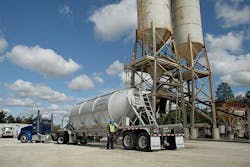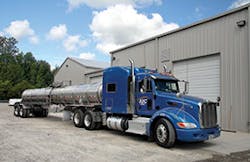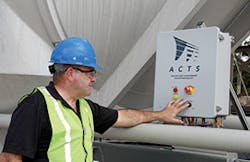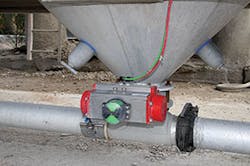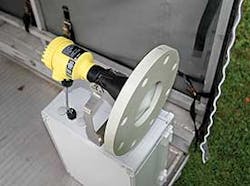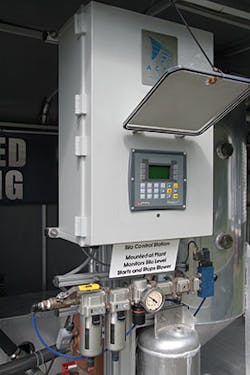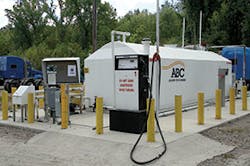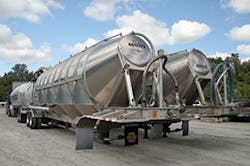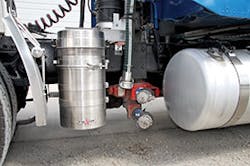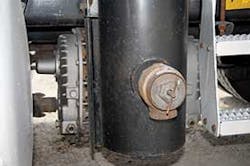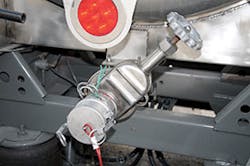Atlantic Bulk Carrier finding success with automated dry bulk unloading system
TOP EXECUTIVES from Atlantic Bulk Carrier Corporation first saw a demonstration of the Automated Cargo Transport Systems technology while attending a cargo tank equipment exhibition in 2007. They immediately recognized the value of the system, which makes it possible to automatically transfer dry bulk commodities from trailers to plant silos.
Atlantic Bulk Carrier was one of the early adopters of the ACTS technology, and management credits the system for playing an important role in the Providence Forge, Virginia-based tank truck carrier’s steady growth in recent years. In fact, the management team was impressed enough with the ACTS technology that they bought the company in 2010.
“When we saw that system at the 2007 National Tank Truck Carriers Cargo Tank Maintenance Conference and Equipment Show, we realized we could use it to attract new business,” says Gary W Short, Atlantic Bulk Carrier treasurer. “By 2008, we had identified a customer that would benefit significantly from the ACTS product. The customer, a cat litter manufacturer, had experienced some inbound product run outs that had threatened temporary production shutdowns.
“We average eight to 10 loads of powdered bentonite clay every day to that plant. If they don’t have the clay, the plant shuts down. When we discussed the ACTS product with our customer, they understood the benefits and agreed to invest in the technology on their side of the operation. On our side, we installed the ACTS equipment on 10 dry bulk trailers.
“This has been a winning arrangement. We’re now delivering 2,000-plus loads of powdered bentonite clay a year to that plant without a single problem. We have been doing that since the system went online at the plant five years ago.”
Two systems
Divided into two systems—one for dry bulk trailers and the other for storage silos at a plant location—the ACTS technology uses programmable logic controllers from Unitronics, an Israeli company, to manage dry bulk product transfer from trailers to the silos. Real-time silo inventory information and dry bulker unloading status are displayed through the web-based ACTS monitor software application that can be accessed with either desktop computers or smart phones.
Atlantic Bulk Carrier page 2...
“These PLC units are bulletproof,” says Warren Groseclose, Atlantic Bulk Carrier vice-president of operations and ACTS president. “They are very reliable and very durable, and there simply isn’t much in the system that could fail. The controllers work well in a dirty environment. Even the first generation hardware is still working well as long as it is maintained. We expect these systems to last at least 12 to 15 years.”
Trailer-mounted hardware includes a control panel that manages the unloading process and monitors tank pressure, line pressure, and valve positions. AT Control air actuators operate the butterfly valves on the trailer. A seven-pin control signal quick connector links the trailer system to the silo controller.
The silo control panel operates a stationary blower at the plant site and collects data on the silo inventory level via an Ohmart/Vega radar sensor mounted at the top of the silo.
The radar level gauge typically used in the ACTS system is designed for silos up to 50 feet high. ACTS also offers a sensor that works with silos up to 230 feet high. The sensors are accurate to within 3/16 inch, and they only have to be calibrated at the time of installation.
The radar level sensors make it possible to see silo inventory levels in real time. An on-line application graphically shows inventory details for each silo. Report tabs provide an inventory summary at two-hour intervals and a weekly usage report. For customers with multiple locations, a master inventory report shows live data at all sites on one screen. All inventory histories are kept for 30 days.
“This system provides strategic advantages for both plant operators and the carriers that serve them,” Groseclose says. “Fleets achieve better tractor and driver utilization, and they don’t need tractor or trailer blowers, because the blower is on the plant side. Plant managers are able to keep a closer watch on silo inventories and avoid plugged lines and silo overfills. Dry bulk trailers can be pre-staged to ensure that product never runs out.”
Efficient operation
At the cat litter plant served by Atlantic Bulk Carrier, the delivery process is quick and easy. The driver backs up a dry bulk trailer to one of four unloading stations serving the 190 ton silo at the plant. The customer reportedly plans to add another silo and four more unloading stations in 2014.
Atlantic Bulk Carrier page 3...
Once the trailer is in place, the driver connects the hot line (blower line), product line, compressed air line (needed for the air-operated valves), and the electric and communication lines. After selecting the silo on the plant control panel, the driver pushes the start button, and the system takes over. The whole set-up process takes five to 10 minutes.
As the product transfer process commences, the PLC system monitors lines pressures to detect possible blockages. “The system automatically tries to clear the line, and it is successful most of the time,” says Lawrence Hunns, ACTS service technician. “Plugs are very rare. The system automatically shuts down if too much pressure builds up in the tank. The system also shuts down if it can’t reach the correct operating pressure in a set amount of time.”
When the silo is full, the ACTS system shuts off the transfer operation, clears all of the product lines, and equalizes the air pressure throughout the system. “ACTS can accurately mimic a driver’s actions throughout the product transfer process,” Hunns says. “The system can significantly cut product transfer times, compared to even the best drivers.”
Cement beginnings
The ACTS technology was developed and patented in the 1990s by Andy Hynick, a cement industry veteran. He later sold the ACTS technology to Axion LLC, an investment company in West Chester, Ohio.
By 2004, the system was being marketed to the trucking industry. The technology was embraced by a small, but loyal group of companies that transport or handle dry bulk materials, and the customer base grew steadily.
Atlantic Bulk Carrier was among the customers that became concerned when the ACTS operation announced in 2009 that it would have to shut down due to the collapse of the cement industry.
“We had found this system to be very beneficial to us and our customers,” Short says. “We decided we couldn’t let the ACTS operation shut down. We needed the technology, and we believe it has a bright future. So, we bought the company, existing parts inventory, demonstration equipment, and the patents for the United States and Canada.
“We make it clear to our customers that while ACTS is owned by the Atlantic Bulk Carrier principals, it is a free-standing operation. It operates under its own name.”
Atlantic Bulk Carrier page 4...
Rebuilding effort
All of the original employees were gone by the time of the sale, and the Atlantic Bulk Carrier team had to rebuild the ACTS operation after the sale closed in November 2010. Groseclose was put in charge of the ACTS operation, and he brought in Hunns, who had worked for ACTS part-time under the previous owners, and Teresa Sollowin, ACTS project engineer.
Since 2010, ACTS technology has been added to 23 plant locations, and can handle any dry bulk material. The cement industry remains a key target market for the system, but ACTS representatives are promoting the benefits of the system for a wide range of dry bulk operations.
“ACTS has one cement customer with eight silos that takes up to 30 loads of cement and fly ash a day,” Groseclose says. “ACTS automation is currently operating on nylon pellets, clay, cement, fly ash and limestone. It greatly enhances truck driver productivity and plant inventory control, plus it helps ensure tighter oversight of operating costs.”
He acknowledges that the initial cost of the system is one of the biggest drawbacks. For example, its costs about $20,000 to outfit a dry bulk trailer with the system, and a fleet will need to start with at least three trailers.
“On the plant side, many potential customers don’t want to make a long-term commitment to a carrier willing to install ACTS,” Groseclose says. “We’re trying to overcome that obstacle by offering different lease options and helping the carrier convince its customer that costs will go down with the ACTS technology.”
Customer options
Atlantic Bulk Carrier also is promoting the ACTS system by offering options to plant operators. The carrier currently has two customers using the system. In one case, the carrier invested in the entire system for both the plant side and its own dry bulk trailers. For the other arrangement, the plant acquired the ACTS system for its side of the operation, and Atlantic Bulk Carrier purchased the trailer system.
To serve those two customers, Atlantic Bulk Carrier has outfitted 16 dry bulk trailers in all with the ACTS technology. Six are vacuum-pneumatic bulkers. One customer is the cat litter producer, while the other receives bulk shipments of nylon pellets that are transported from Dalton, Georgia, to Sparta, Tennessee.
“We’re continuing to promote that ACTS technology to others that we believe would find it beneficial,” Short says. “We became convinced long ago that the system makes good economic sense and provides a critical level of protection to ensure that manufacturing sites and other operations don’t suffer unscheduled shutdowns due to run-outs of raw materials.
Atlantic Bulk Carrier page 5...
“We also believe that the ACTS technology will help us deal more effectively with the driver shortage. This technology can help solve some of the driver supply problems, because a single driver can handle multiple trailers and does not have to stand outside in the elements to unload.”
Short adds that Atlantic Bulk Carrier is benefitting from a strong economy in its operating area. “The economy is good for us,” he says. “We’re seeing the emergence of a manufacturer-led economy. Manufacturers are returning to the United States, drawn by factors such as lower natural gas prices.”
For the most part, Atlantic Bulk Carrier is a southern fleet with terminals in Virginia, Georgia, North and South Carolina, and Tennessee. Operations are conducted throughout the Southeast, Gulf Coast, and as far west as Missouri.
The ACTS-equipped bulkers are part of a growing fleet that includes 600 liquid and dry bulk trailers and 160 tractors. The fleet hauls a range of cargoes, including clay products, resins, acids, and petroleum products. However, plastic pellets are the primary commodity.
Atlantic Bulk Carrier operates Polar and J&L Tank dry bulk trailers with capacities ranging from 1,582 cubic feet to 2,140 cubic feet. The most common dry bulker in the fleet holds 1,630 cubic feet of product.
Tank hardware includes UltraFlo and SureSeal butterfly valves, Dixon Bayco check valves and pressure-relief vents, and Allegheny pipe couplers. Running gear includes Hendrickson Intraax air suspensions with Meritor or Haldex roll stability, Michelin tires, and Alcoa aluminum disc wheels.
For chemical cargoes, the carrier buys Polar DOT407 stainless steel tankers with capacities ranging from 4,500 to 7,000 gallons. Tanks are specified with Betts outlets, Fort Vale pressure/vacuum relief vents, and ground-level vapor recovery and air line connections that keep drivers off the tops of the trailers.
Peterbilt Model 386s dominate the tractor fleet, but Freightliners (the newest being Cascadias) account for the remaining 20%. Peterbilts are specified with Cummins ISX15 engines, and the newest Freightliners have the Detroit DD15. Eaton Fuller 10-speed manual transmissions are spec’d in all of the tractors. Like the trailers, the tractors come with roll stability systems.
Atlantic Bulk Carrier page 6...
Tractor-mounted product handling hardware includes Gardner Denver blowers for dry bulk cargoes and Roper pumps for liquids. Blowers and pumps are powered directly off the tractor PTO.
Maintenance system
Much of the vehicle maintenance is handled in-house. Atlantic Bulk Carriers’ largest maintenance facility is at the headquarters terminal in Providence Forge.
The 40-year-old shop at the headquarters terminal got an $850,000 overhaul in 2012. Four new bays were added, increasing shop space by 8,000 square feet, and the original shop area was resurfaced and more insulation was added.
Facility security was significantly enhanced with a bank-style digital camera system. Seventeen cameras provide coverage of shop bays and the vehicle parking area.
Two of the new bays are for tractor and trailer maintenance, one is for cargo tank tests and inspections, and one is a dry bulk trailer wash bay. Carbis safety platforms were installed in the inspection and wash bays to protect workers who need to climb on top of a trailer.
Six to seven dry bulk trailers a day are cleaned in the single wash bay. Chemical tankers are cleaned at commercial wash racks, primarily QualaWash.
Pressure washers were supplied by East Tennessee Chemical, which also provides the detergent used in cleaning dry bulk trailers. A Pur-Water reclaim system recycles the wash water for reuse. Atlantic Bulk Carrier also installed a catchment system that collects rain water off the shop roof for use in the tank cleaning operation. Recycled and collected water is stored in 1,500-gallon underground tanks.
The fuel island got an upgrade that included a new 10,000-gallon aboveground diesel tank and more spill containment. The Petrovend card reader system is integrated with the T-Chek fuel purchase system used throughout the Atlantic Bulk Carrier operation.
Clearly, Atlantic Bulk Carrier management team believes the economy will remain strong for tank truck operations, and they have positioned the carrier for strong future growth. ♦
About the Author
Charles Wilson
Charles E. Wilson spent 31 years covering the tank truck, tank container, and storage terminal industries throughout North, South, and Central America as the editor of Bulk Transporter. Prior to 1989, Wilson was managing editor of Bulk Transporter and Refrigerated Transporter and associate editor of Trailer/Body Builders. Before joining the three publications in Houston TX, he wrote for various food industry trade publications in other parts of the country. Wilson has a bachelor's degree in journalism from the University of Kansas and served three years in the U.S. Army.
